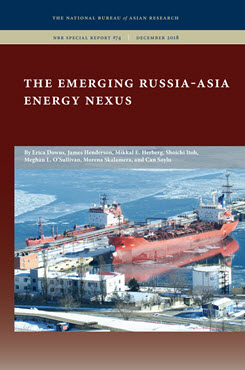Russia's Energy Foray into Asia
Implications for U.S. Interests
This essay examines Russia’s growing role in Asia’s energy markets, assesses the implications for the U.S., and examines the claim that closer Sino-Russian energy ties are adding new incentives for a broader strategic alignment.
EXECUTIVE SUMMARY
MAIN ARGUMENT
China and Russia are forging closer ties to build a “multipolar world” and challenge what they lament as U.S. unilateralism. Energy ties are the backbone of this evolving economic partnership: China has become Russia’s main source of funds and its single biggest energy customer. Yet this essay argues that recent developments do not indicate the formation of a true strategic partnership that is based on a common set of values or a developed worldview that encompasses both powers. China is interested in purchasing Russian oil and gas, but still privileges economic relations with the U.S. Russia, meanwhile, feels uncomfortable about the growing power asymmetry with China, which highlights a shortcoming in the Kremlin’s claim of resurgent Russian greatness. Russia also displays a state-led mercantilist economic policy that seeks to augment its prowess at the expense of China. While a status-concerned Russia might in principle welcome a firm alliance meant to discomfit the U.S., there is limited value in advancing a strategic alignment (let alone an alliance) for China. Beijing has the upper hand, and keeping its options open will continue to deliver maximum benefits.
POLICY IMPLICATIONS
- While energy has not provided the springboard to a more robust strategic partnership, increasing tensions between China and the U.S. may provide Moscow with new openings to draw closer to Beijing. U.S. policymakers must track developments between Russia and China carefully, as a closer relationship between the two could pose new strategic challenges to the U.S.
- The U.S. should be aware that its more aggressive stance toward China—vis-à-vis trade and other factors—inadvertently plays into Russia’s hands by diminishing the U.S. role as an energy competitor for Chinese markets. This approach also removes a Chinese rationale for keeping a distance from Russia: the desire not to complicate relations with the U.S.
- U.S. policymakers should remove barriers to U.S. liquefied natural gas development to ensure that China has alternative sources of natural gas apart from Russia.
Meghan L. O’Sullivan is the Jeane Kirkpatrick Professor of the Practice of International Affairs and the Director of the Geopolitics of Energy Project at Harvard University’s Kennedy School of Government.
Morena Skalamera is an Associate in the Geopolitics of Energy Project at Harvard University’s Kennedy School of Government and an Assistant Professor at Leiden University.
Can Soylu is a Fellow in the Geopolitics of Energy Project at Harvard University’s Kennedy School of Government.



